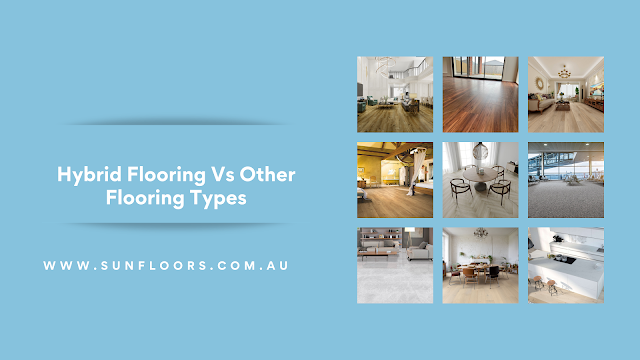Hybrid Flooring Vs other Flooring Types
Hybrid flooring has gained popularity in recent years as a versatile and durable flooring option. To help you understand how hybrid flooring compares to other types of flooring, let's explore some key aspects and differences between hybrid flooring and several other common flooring options:
Hybrid Flooring vs. Laminate Flooring:
Composition: Hybrid flooring is engineered with multiple layers, including a rigid core, vinyl top layer, and often an attached underlayment. Laminate flooring consists of a particleboard core with a printed image layer and a protective wear layer.
Water Resistance: Hybrid flooring is more water-resistant than laminate, thanks to its waterproof core and vinyl top layer. Laminate can warp or swell when exposed to moisture.
Durability: Hybrid flooring is typically more durable and resistant to dents and scratches than laminate. It's a better choice for high-traffic areas.
Hybrid Flooring vs. Vinyl Flooring:
Core Material: Hybrid flooring has a rigid core that provides additional stability, while vinyl flooring is more flexible due to its PVC composition.
Appearance: Both offer a wide range of design options, but some people prefer the more realistic texture of hybrid flooring.
Installation: Hybrid flooring may require more skill to install due to its rigid core, while vinyl is often easier to work with.
Hybrid Flooring vs. Hardwood Flooring:
Cost: Hybrid flooring is generally more budget-friendly compared to hardwood, which can be expensive both in terms of materials and installation.
Maintenance: Hybrid flooring is easier to maintain because it doesn't require refinishing or special treatments like hardwood. It's also more resistant to moisture and scratches.
Aesthetics: Hardwood flooring provides a timeless, natural look that some homeowners prefer, but hybrid flooring can mimic the appearance of hardwood effectively.
Hybrid Flooring vs. Tile Flooring:
Installation: Hybrid flooring is typically easier and faster to install compared to tile, especially when it comes to floating installations.
Comfort: Hybrid flooring is warmer and softer underfoot compared to ceramic or porcelain tiles.
Design: While both offer various design options, tile flooring can provide a more authentic stone or ceramic look.
Hybrid Flooring vs. Carpet:
Maintenance: Hybrid flooring is easier to clean and maintain than carpet, which is prone to staining and requires regular vacuuming.
Allergies: Carpets can trap allergens, while hybrid flooring doesn't, making it a better choice for individuals with allergies.
Durability: Hybrid flooring is more durable and resistant to wear and tear than carpet, especially in high-traffic areas.
In summary, hybrid flooring combines some of the best features of different flooring types, offering water resistance, durability, and a variety of design options. However, the best flooring choice for your specific needs will depend on factors like your budget, aesthetic preferences, and the room's purpose. It's essential to weigh these factors carefully before making a decision.




Comments
Post a Comment